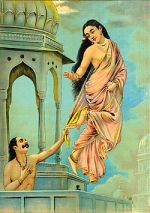There are certain things in life that are preordained, either due to our destiny or due to our karma. The sagacious ones, thus, often say that destiny is nothing but our karma yielding its consequences. On top of that, our ignorance coupled by our momentary passions blended in our ego, ends in cul-de-sac. The greatest human folly does lie in the fact that we don’t learn from History, we repeat it.
The kings who inherited the throne of Hastinapur after Bharata repeated the mistakes of their ancestors not once but multiple times, sometimes due to innocence and sometimes due to ignorance.
Once Pratipa, a descendant of the Kuru bloodline, was meditating under a tree when he was approached by the river-goddess Ganga. She requested Pratipa to make her his daughter-in-law for reasons unstated. Not wanting to turn away the beauty who was considered a goddess and had approached to be a part of his family line, Pratipa agreed to it and assured her that his son, Shantanu, would marry her one day. Pratipa addressed Shantanu and made his intentions clear. Shantanu, being an obedient son, agreed to his father’s will without even trying to know the reason.
Years later, the young and handsome Shantanu (if you do not remember what I mean by an italicized “young and handsome” then click here) was out on a hunt near the banks of Ganga when he saw a young beautiful woman. A face as serene as the Gangotri glacier and a complexion as flawless as the pure river Ganga (of those times, not today) captivated Shantanu in an instant. On inquiry, Ganga revealed that she was none other than goddess Ganga in a human form. Driven both by his promise to his father and the uncontrollable desire that was a result of Ganga’s exquisiteness (majorly because of the latter), Shantanu put forward the proposal for Ganga to be his queen. Ganga who was already willing for this readily accepted to the proposal putting forward a condition, much in the way Urvashi had put forward a condition for Pururava (click here to see how).
***
Ganga: Promise me, that you will never ask me any question.
Shantanu: I promise! Neither will I ask a question nor will I ever stop you from doing what you want to.
Ganga: If you ever ask me a question, I will still answer it but will be gone from your life forever.
Shantanu: Such a day will never come. I promise.
***
As you might have guessed, such a day did come but after years and with revelations far beyond Shantanu’s wits.
Shantanu was busy enjoying his married life with Ganga, neglecting his kingdom and focusing only on giving an heir to Hastinapur. The king succeeded and the news spread out in the kingdom that Ganga was ready to conceive Shantanu’s first child. The entire kingdom and Shantanu waited for the maids to bring the news of the birth of a prince/princess. Ganga gave birth to a child and before anyone could have a glance, she was seen to be leaving for the banks of Ganga, with her new-born in her hands.

Ganga, being a goddess wasn’t as weak as usual women get after delivery. The delivery had not had any impact on her appearance or her strength and she moved towards the banks of Ganga without any assistance. Shantanu followed her but didn’t ask her anything keeping with the promise he had made – the promise that was the basis of their marriage. What he saw next horrified him and burnt his heart with agony. Ganga drowned her new-born into the waters of river Ganga and Shantanu could only see and do nothing. Ganga replied to the glaring anger on Shantanu’s brow with her enchanting yet cold smile, the one that had seduced Shantanu in their very first meeting.
Since there was no question to be asked and no answer to be given, Shantanu finally submitted to the queen again and their lives continued like before with thousand questions in his heart but not one on his lips.
A few weeks later there was news of Ganga being pregnant again and the entire kingdom again became hopeful waiting for an heir while at the same time fearing that the second child would suffer the same fate as the first. The fears did come true. The very next moment Ganga drowned her second child too. Shantanu was aghast to see how a mother could drown her new-born into a river with such ease. He was aghast to see how a wife could deprive her husband of his sons. He was aghast to see how a queen could deprive a kingdom of its heir. Was the woman he married a heartless witch or a demoness seeking some revenge? The Kshatriya, Chakravarti king of kings of the Kuru clan could only ponder upon and do nothing.
One after the other, Ganga drowned seven of her new-born babies in the river not being stopped or questioned by anyone. The entire kingdom was flabbergasted with the queen and deeply annoyed with the king who did nothing out of his promise (many suspected it was his lust that was a slave of Ganga’s pulchritude) to stop her. Shantanu himself lost all hopes of having any heir as he had grown old and he knew that with Ganga as his wife hopes will remain only hopes, never turn into reality.
And then, there was the news that Ganga is pregnant again. With the eighth child in his wife’s womb, Shantanu was determined to have his heir this time whatever it might cost him. On delivery, Ganga proceeded towards the river in the same fashion, but this time Shantanu was not like the earlier one.
“STOP!”, he cried. “What kind of woman are you to have drowned your seven children in the river on their very birth. Even a nagin is better than you to leave its child alive. What have these harmless souls done to deserve this fate? You have already deprived me of my seven sons, I will not allow you take this one from me.” said Shantanu with a voice filled with anger that Ganga had never seen before.
Ganga stopped herself and turned. She saw Shantanu standing there with a pitiable face, not at all characteristic of a Kshatriya, and eyes full of disgust for Ganga. She went to Shantanu with that forever enchanting smile.
Ganga: Today you have broken your promise by asking me a question. I knew this would happen one day. You have suffered enough to see what all you had to.
Shantanu: Why did you do all this? Why did you kill seven of our innocent sons?
Ganga: I did not kill them Maharaj. I just set them free from this world, Mrityulok, where there is so much suffering. It was a curse that I was living, you are living and a curse that your sons were living.
Shantanu: Which curse?
Ganga: In your previous life as king Mahabhishak, you were a great warrior and a friend of the lord of the devas, Indra. You were a more than occasional visitor to his court that is famous for its wine and damsels. One day, I, accompanied by my father Brahma, visited that court where you were already present. In our very first encounter you kept gazing at me and so did I. A wind blew that caused my upper garment to slip from my shoulders that I did not realize. The court full of devas lowered their eyes out of respect but you kept glaring at me unabashedly. I too could not take my eyes off you. This public display of desire angered my father Brahma and he cursed you to be born on earth as a mortal and suffer the pain that mortals do. I too was cursed to descend on earth as a mortal and return only after breaking your heart. Today, after asking me this question you have set me free from my curse, just like I set seven of your sons from their curse.
Shantanu: Which curse were my sons living? Were they too pawns at the hands of the devas?
Ganga: These sons of yours are the eight vasus who were cursed by Rishi Vashisht to be born on earth as mortals and suffer the pain like them. (To read the details of the curse, click here). The eight vasus approached me, the mother of all beings, to save them from this. I promised to give them birth through my own womb and set them free as soon as they were born. That is what you had been seeing all this while, shocked, as you had no idea about your previous life and the curses. The cause of all sufferings is rooted in our past karma.
Shantanu: But at least, I have my one son alive now who will be my heir and three of us can live together happily, now that everything is revealed.
Ganga: I apologize but I do not see that happening, my king. You have broken your promise and this means I will have to leave you now. By obstructing the flow of destiny, you have managed to save your eighth child but happiness is not something that he will know for long. He is a great soul but not destined to be an heir nor to see his progeny inheriting the throne.
Shantanu: That’s not true! I will not let this happen. He is my son and I will ensure that he inherits my throne.
Ganga: Try as you will. What’s written in the destiny cannot be changed. All I can do for you is to take him away and impart him education from the best teachers in the world. He will be a master at politics, philosophy, religion and martial arts. He will follow the code of conduct of a Kshatriya like no other man has ever followed, no other man ever will. After he graduates, I will send him back to his father well prepared. Time will tell the rest of the story. 
***
Saying this, Ganga left with her eighth born to return later, leaving Shantanu alone. Shantanu wondered what life had for him ahead and how much of it was now dependent on his past karma that he was still unaware of.


